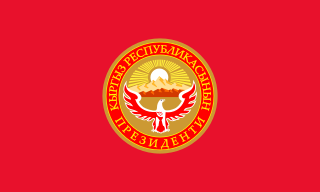Related Research Articles

The politics of Kyrgyzstan, officially known as the Kyrgyz Republic, takes place in the framework of a presidential system representative democratic republic, whereby the President is head of state and the Chairman of the Cabinet of Ministers is head of government. Executive power is exercised by the government. Legislative power is vested in both the government and parliament. The Economist Intelligence Unit rated Kyrgyzstan a "hybrid regime" in 2019.

A constitutional court is a high court that deals primarily with constitutional law. Its main authority is to rule on whether laws that are challenged are in fact unconstitutional, i.e. whether they conflict with constitutionally established rules, rights, and freedoms, among other things.

The president of Kyrgyzstan is both the head of state and the head of government and the highest official of the Kyrgyz Republic. The president, according to the constitution, "is the symbol of the unity of people and state power, and is the guarantor of the Constitution of the Kyrgyz Republic, and of an individual and citizen." The president is directly elected for no more than one six-year term by the Kyrgyz electorate. The office of president was established in 1990 replacing the Chairman of the Supreme Soviet that existed, in different forms, from 1927 whilst the country was known as the Kirghiz Soviet Socialist Republic.

The Supreme Court is the final court of appeal in the United Kingdom for all civil cases, as well as for criminal cases originating in England, Wales and Northern Ireland. It also hears cases of the greatest public or constitutional importance affecting the whole population.

The Supreme Constitutional Court is an independent judicial body in Egypt, located in the Cairo suburb of Maadi.

The Jogorku Kenesh is the unicameral Parliament of the Kyrgyz Republic. It was known as the Supreme Soviet of the Kirghiz Soviet Socialist Republic until 1991.

A supreme court is the highest court within the hierarchy of courts in many legal jurisdictions. Other descriptions for such courts include court of last resort, apex court, and highcourt of appeal. Broadly speaking, the decisions of a supreme court are not subject to further review by any other court. Supreme courts typically function primarily as appellate courts, hearing appeals from decisions of lower trial courts, or from intermediate-level appellate courts.

A new constitution of Kyrgyzstan was passed by referendum on 21 October 2007. It is based on the first post-Soviet constitution originally adopted on 5 May 1993.

A constitutional referendum was held in Kyrgyzstan on 21 October 2007, following the constitutional crisis caused by amendments passed since the Tulip Revolution in 2005 being invalidated by the Constitutional Court of Kyrgyzstan on 14 September 2007. Voters were asked whether questions on a new constitution and electoral law. Both were approved by over 95% of voters.
Early parliamentary elections were held in Kyrgyzstan on 16 December 2007. The election was called by President Kurmanbek Bakiyev after the constitutional referendum on 21 October 2007 approved a new electoral system and constitutional reform proposals, enlarging the parliament to 90 MPs and introducing party-list voting.

Early presidential elections were held in Kyrgyzstan on 30 October 2011 to replace Interim President Roza Otunbayeva. Former Prime Minister Almazbek Atambayev of the Social Democratic Party of Kyrgyzstan won in the first round.

A constitutional referendum was held in Kyrgyzstan on 27 June 2010 to reduce presidential powers and strengthen democracy in the wake of the riots earlier in the year. Parliamentary elections followed on 10 October 2010.
Justices of the Supreme Court of the United Kingdom are the judges of the Supreme Court of the United Kingdom other than the president and the deputy president. The Supreme Court is the highest in the whole of the United Kingdom for civil matters, and for criminal matters from the United Kingdom jurisdictions of England and Wales and Northern Ireland. Judges are appointed by the Queen on the advice of the Prime Minister, who receives recommendations from a selection commission. The number of judges is set by s.23(2) Constitutional Reform Act 2005, which established the Court, but may be increased by the Queen through an Order in Council under s.23(3). There are currently 12 positions: one President, one Deputy President, and 10 Justices. Judges of the Court who are not already peers are granted the style Lord or Lady for life.

Azimzhan Askarov was an ethnic Uzbek Kyrgyzstani political activist who founded the group Vozduh in 2002 to investigate police brutality. During the 2010 South Kyrgyzstan ethnic clashes, which primarily targeted people of the Uzbek nationality, Askarov worked to document the violence.

The judicial system of Kyrgyzstan comprise a number of courts in a hierarchy:
The Constitutional Court of Kyrgyzstan was formerly the highest court of Kyrgyzstan's legal system. It judges on the constitutionality of laws and is composed of nine judges. Critics argue that its politically charged judgement such as allowing President Akayev to re-run for President despite the Presidency being limited by term limits are evidence of a lack of judicial independence. The Constitutional Court was abolished in 2010 with the adoption of the new Constitution and its powers transferred to the Supreme Court.

A constitutional referendum was held in Kyrgyzstan on 11 December 2016. The constitutional amendments were approved by around 80% of voters.

The Constitutional Chamber of the Supreme Court of the Kyrgyz Republic is Kyrgyzstan's highest judicial authority which independently performs the constitutional oversight of legislation.

A constitutional referendum was held in Kyrgyzstan on 11 April 2021. The new constitution was approved by 85% of voters.

The Constitution of Kyrgyzstan is the supreme law of the Kyrgyz Republic. Kyrgyzstan first got a constitution in 1993, a year and a half after the country had gained independence from the Soviet Union in 1991. It has gone through a few constitutions, with the last one being adopted in April 2021.
References
- ↑ Kyrgyzstan: The Challenge of Judicial Reform Crisis Group Asia Report N°150, 10 April 2008, p.3
- ↑ "BBC News - Q&A: Kyrgyzstan referendum". 24 June 2010.